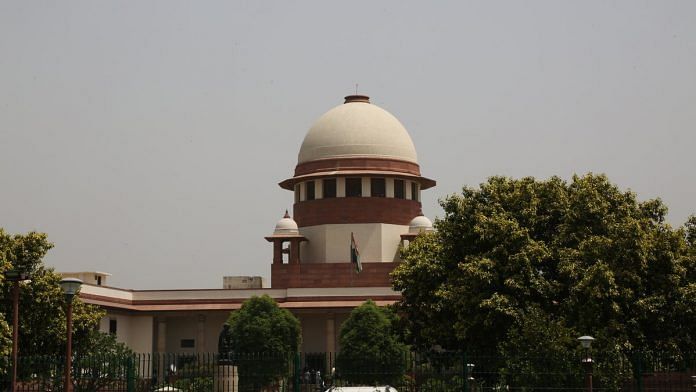New Delhi: The Supreme Court Thursday upheld the decision of Jharkhand High Court granting compulsory retirement to two judicial officers including one who had used “highly sexist” remarks during his lectures to civil services probationers.
The top court said the standard of integrity and probity expected from judicial officers is much higher than that expected from other officers.
It also upheld the decision of the high court granting compulsory retirement to the other judicial officer for granting bail to a person by taking bribe in a non-bailable offence under section 327 of IPC (voluntarily causing hurt to extort property).
A bench of Justices L Nageswara Rao and Deepak Gupta dismissed the petitions of two judicial officers, Arun Kumar Gupta and Raj Nandan Rai, who challenged the high court decision taken on the administrative side.
“Senior judges of the High Court who were the members of the Screening Committee and Standing Committee have taken a considered and well reasoned decision. Unless there are allegations of mala fides or the facts are so glaring that the decision of compulsory retirement is unsupportable this court would not exercise its power of judicial review,” the bench said.
It said that in such matters the court on the judicial side must exercise restraint before setting aside the decision of such collective bodies comprising of senior High Court Judges.
“In our opinion these are not fit cases to interfere with the said decisions,” the bench said.
The top court said that it was settled law that adverse entries with regard to integrity do not lose their sting at any stage and rejected the submission of the two judicial officers that they have been granted various promotions in their career which would have the effect of washing off their previous adverse entries, if any.
“A judicial officer’s integrity must be of a higher order and even a single aberration is not permitted,” the bench said.
Dealing with the case of Gupta, the bench said that there are two very serious allegations against him.
It said that first allegations pertains to his tenure as Deputy Director, Administrative Training Institute at Ranchi, when as many as 10 women civil service probationers had alleged that he was using unwarranted and objectionable language during his lectures, citing indecent examples and using words having double meaning, thereby causing embarrassment to the lady officers.
“We have perused the complaints which are filed with the reply and the common refrain is that the language used by Gupta during his lectures was highly sexist,” the bench added.
The top court said that there is another allegation against Gupta that he had physically hurt a washer man by placing a hot iron on his head for allegedly not ironed his clothes properly.
The bench said that this incident of assault was reported by the Principal District Judge to the High Court after the victim had personally approached him immediately after the occurrence and he (the Principal District Judge) found that the victim had sustained burn injuries and got the victim treated.
The top court said that though Gupta was exonerated in the preliminary inquiry by Gupta’s successor judicial officer before whom the complainant denied having suffered any injury.
The apex court said that this was a preliminary inquiry and the complainant Principal District judge was not examined, who had not only been approached personally by the washer man, but who had himself noted the burn injuries and had got the victim treated.
“In our view, the two instances are sufficient to decide the case against the petitioner,” it said, adding that even if the earlier adverse entries in his annual confidential reports are ignored, Gupta cannot be granted relief for the reasons.
Dealing with the case of Raj Nandan Rai, the top court noted that his record on many counts was not at all good and his reputation and integrity have been doubted more than once in the years 1996- 1997, 1997- 1998 and 2004- 2005.
It said that in the year 2015 -2016, Rai’s knowledge of law and procedure was found to be average and his relation with the members of the Bar was found to be not very good.
The bench noted that allegation against him was of having granted bail for illegal gratification and substance in the report of the Judicial Commissioner, Ranchi (who is equivalent to the Principal District Judge).
“The officer (Rai) had granted bail by noting in the order that Section 327 of the IPC was bailable whereas the offence is non-bailable and an unrecorded warning regarding the integrity of the judicial officer was issued to him in 2012,” it said.
Also read: Not just govt, judiciary also to blame for mounting judge vacancies in high courts



